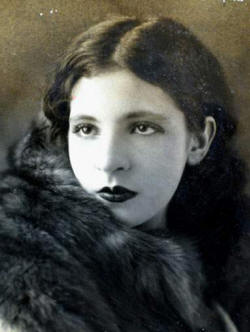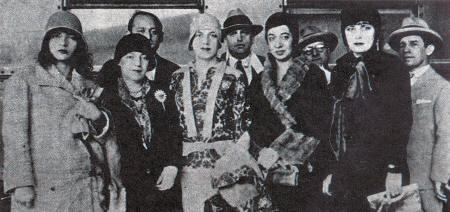

Queer Places:
Cultural Center Patrícia Galvão, Av. Senador Pinheiro Machado, 48 - Vila Matias, Santos - SP, 11075-900, Brazil
 Patrícia Rehder Galvão, known by her pseudonym Pagu (June 9, 1910 – December 12, 1962) was a Brazilian writer, poet, playwright, journalist, and translator who had a large role in the Brazilian Modernist movement. Pagu was also politically active, being associated to the Brazilian Communist Party during the 1930 decade.
Pagu had a relationship with Tarsila do Amaral, a Brazilian writer,
poet, playwright, journalist, and translator. Pagu was with Tarsila in 1929 when
she met her
next partner, Elsie Houston, a Brazilian poet living in France and was married
to French surrealist artist Benjamin Péret. Norma Bengell in her first film,
Eternamente Pagu, a biography of Patrícia Galvão, suggests a lesbian
relationship between Pagu and Elsie Houston (Houston is played in the film by
Bengell herself). During a visit to Brazil in 1939, Houston visited Pagu in
prison. In 1934-1935, during the several months she was in Paris, Pagu resided
with Houston, and it is this relationship, with its lesbian overtones, that
Bengell presents in the film.
Patrícia Rehder Galvão, known by her pseudonym Pagu (June 9, 1910 – December 12, 1962) was a Brazilian writer, poet, playwright, journalist, and translator who had a large role in the Brazilian Modernist movement. Pagu was also politically active, being associated to the Brazilian Communist Party during the 1930 decade.
Pagu had a relationship with Tarsila do Amaral, a Brazilian writer,
poet, playwright, journalist, and translator. Pagu was with Tarsila in 1929 when
she met her
next partner, Elsie Houston, a Brazilian poet living in France and was married
to French surrealist artist Benjamin Péret. Norma Bengell in her first film,
Eternamente Pagu, a biography of Patrícia Galvão, suggests a lesbian
relationship between Pagu and Elsie Houston (Houston is played in the film by
Bengell herself). During a visit to Brazil in 1939, Houston visited Pagu in
prison. In 1934-1935, during the several months she was in Paris, Pagu resided
with Houston, and it is this relationship, with its lesbian overtones, that
Bengell presents in the film.
Born in a family of German descent, Galvão was an "advanced" woman for the moral and social standards of the time.[1] When she was 15 years old, she collaborated with the Brás Jornal newspaper, using the pen name Patsy. She completed the course at the São Paulo Normal School in 1928, and joined the Movimento Antropofágico, influenced by Oswald de Andrade and Tarsila do Amaral. The nickname "Pagu" was given to her by the poet Raul Bopp, who dedicated a poem to her (Coco de Pagu).[2] In 1930, Pagu married Oswald de Andrade, who left Tarsila, then his wife.[3] In the same year, Rudá de Andrade, her first and Andrade's second son is born. Both became militants of the Brazilian Communist Party. Pagu was arrested in 1931 by participating in a harbor workers' strike in Santos,[4] the first in a series of 23 detentions in her life. After her arrest she published the novel Parque Industrial (Industrial Park), under the pseudonym Mara Lobo.[5] In 1935 she was arrested in Paris as a foreign communist using a false identity, and was repatriated to Brazil.[4] She broke up with Andrade, after many quarrels. Pagu resumed her journalistic activity, but was again arrested and tortured by the forces of the dictatorship of Getúlio Vargas, and was jailed for five years. In those five years her son was raised by Andrade. Upon leaving prison in 1940, she broke away from the Communist Party, choosing to instead follow a socialism of Trotskyist line. She joined the newspaper A Vanguarda Socialista along with Geraldo Ferraz, art critic Mário Pedrosa, Hilcar Leite and Edmundo Moniz.[6][7] She married Geraldo Ferraz and from this union her second son was born, Geraldo Galvão Ferraz, on June 18, 1941. She moved in with her two children and her husband. Around the same time she travelled to China, obtaining the first soybean seeds that were introduced in Brazil.[8] In 1945 Pagu launched a new novel, A Famosa Revista, written with her husband Geraldo Ferraz. She unsuccessfully attempted a run for state representative in the 1950 elections. In 1952 she attended the School of Dramatic Art in São Paulo, taking their shows to Santos. Linked to the avant-garde theater, they presented her translation of Ionesco's The Bald Singer. She translated and directed Fando et Lis by Fernando Arrabal, an amateur montage in which the young artist Plínio Marcos debuted. She also translated poems by authors such as Guillaume Apollinaire. Known as a major cultural influence in Santos, Pagu encouraged young talents such as actor and playwright Plinio Marcos and composer Gilberto Mendes. She devoted herself particularly to the stage, especially in encouraging amateur groups.[6] While still working as an art critic, she was stricken with cancer. She traveled to Paris to undergo surgery, but without positive results. Disappointed and desperately sick, Pagu attempted suicide, but did not succeed. Of this episode, she wrote the pamphlet "Truth and Freedom": "A bullet got behind, between gauze pads and shattered memories." She returned to Brazil and died on December 12, 1962, due to the disease.
In 1988, the life of Pagu was told in the film Eternamente Pagu, the first movie directed by Norma Bengell. Carla Camurati played the title role. A song titled "Pagu" was composed by Rita Lee and Zélia Duncan.

From left to right: Pagu, Elsie Lessa, Tarsila do Amaral, Anita Malfatti & Eugênia Álvaro Moreyra circa 1928
My published books: